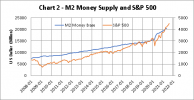moneymakeover
Registered User
- Messages
- 960
I have been considering how to allocate
my pension , what risk to take
One rationale regarding investing in equities is: we can depend on one thing: currency devaluing.
Every time there is a crisis governments across the world will respond by printing money.
The value of the sp500 (say 4400) market cap is around $38 trillion.
Economic activity has been reduced if anything during the pandemic and yet it has doubled over past 5 years.
Further money printing, in the next crisis will see the markets go even higher.
I say all this by way of explanation as to why it makes sense to remain invested in equities long term in a pension portfolio.
To illustrate,

 seekingalpha.com
seekingalpha.com

my pension , what risk to take
One rationale regarding investing in equities is: we can depend on one thing: currency devaluing.
Every time there is a crisis governments across the world will respond by printing money.
The value of the sp500 (say 4400) market cap is around $38 trillion.
Economic activity has been reduced if anything during the pandemic and yet it has doubled over past 5 years.
Further money printing, in the next crisis will see the markets go even higher.
I say all this by way of explanation as to why it makes sense to remain invested in equities long term in a pension portfolio.
To illustrate,

Money Supply: A Good Predictor For S&P 500 Index
The relation between the stock market and money supply is examined at different lags to formulate a predictive model for the stock market.

Last edited: